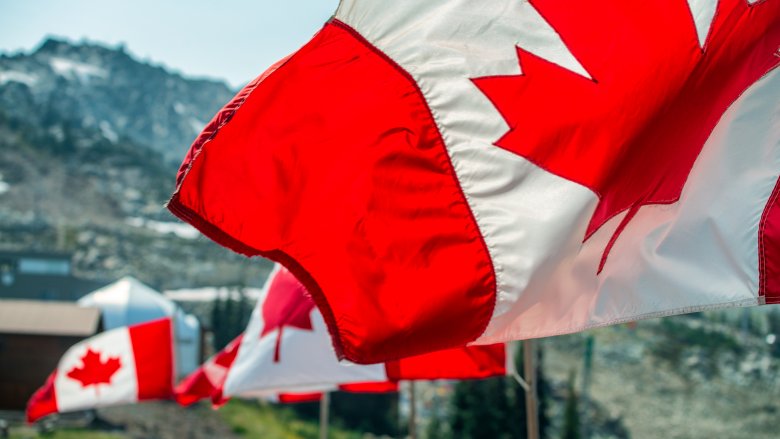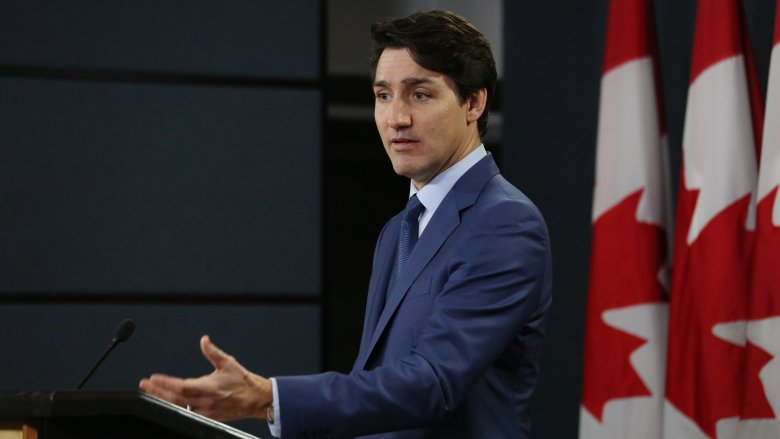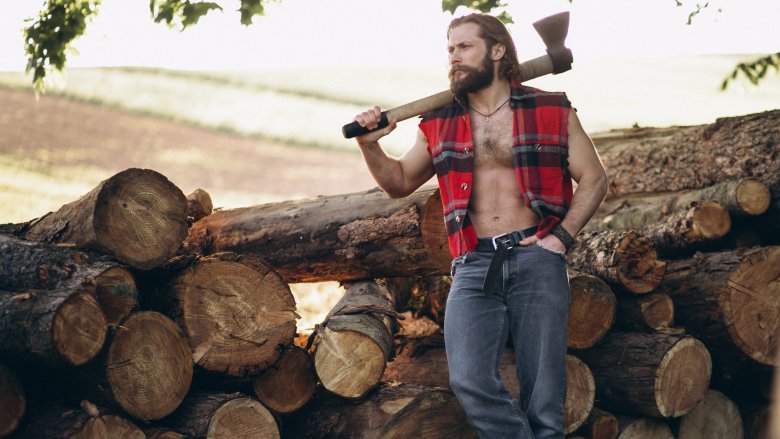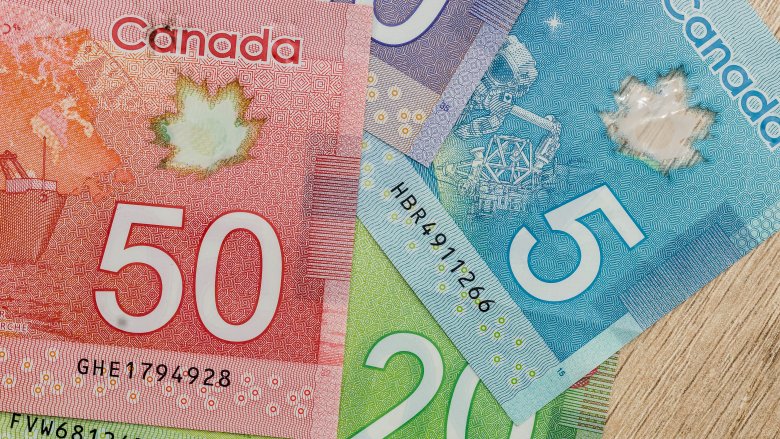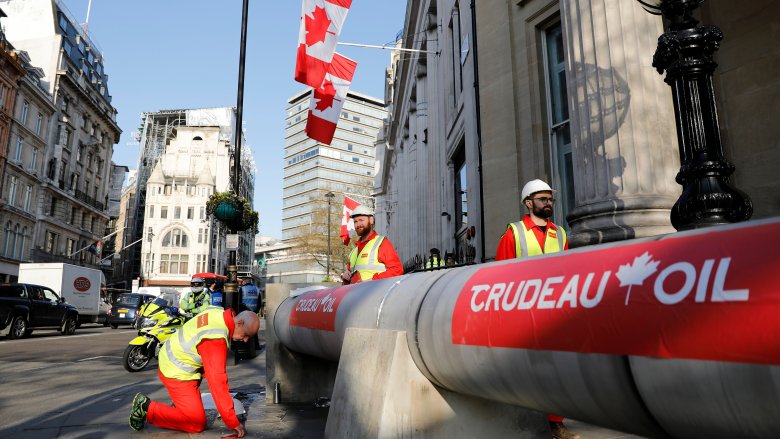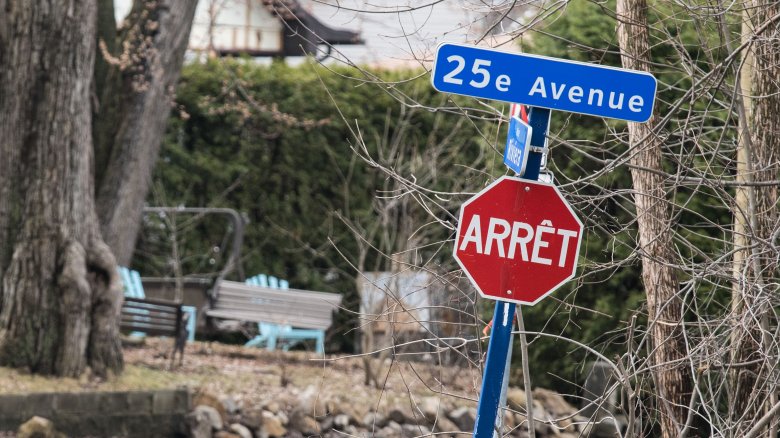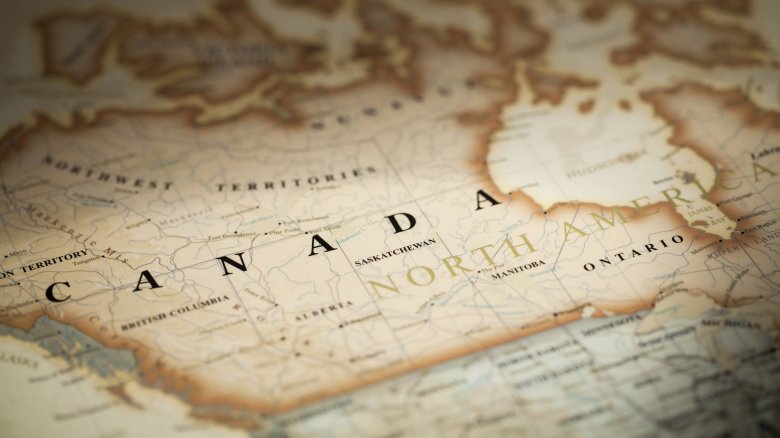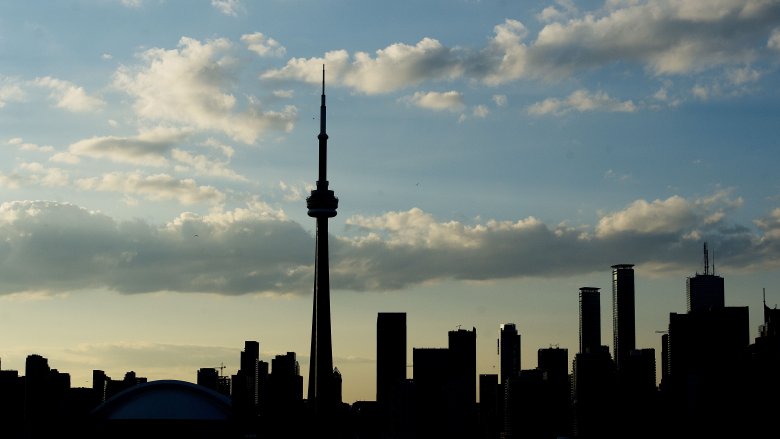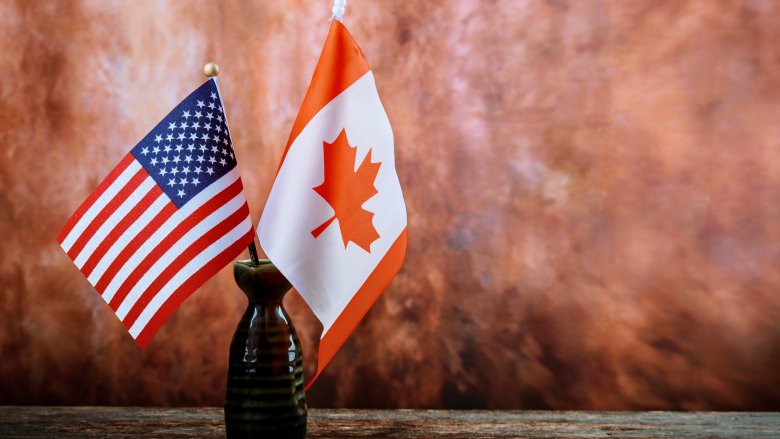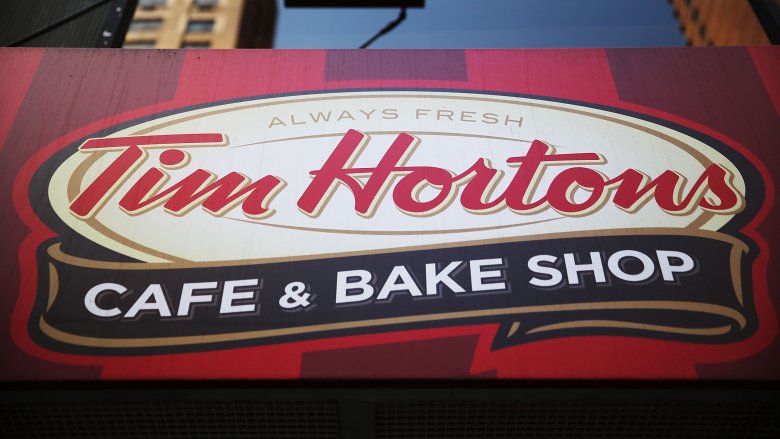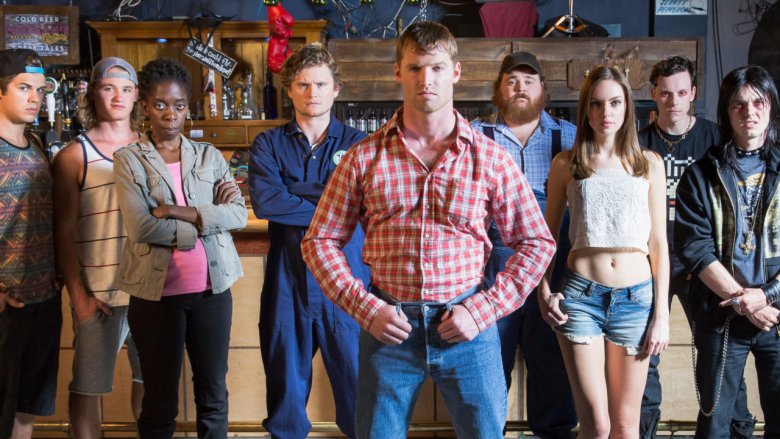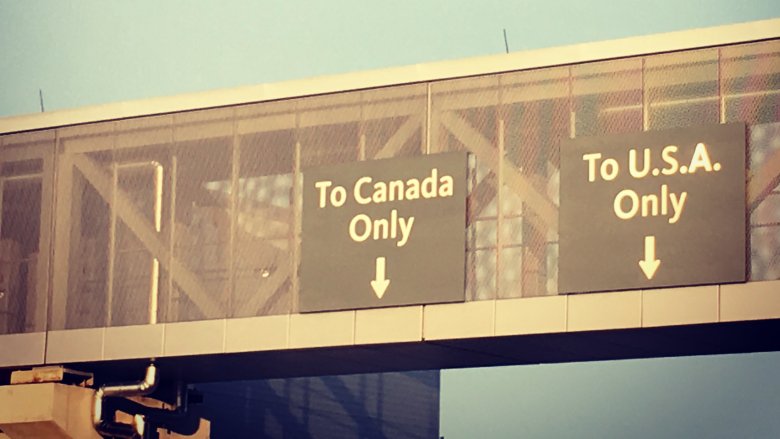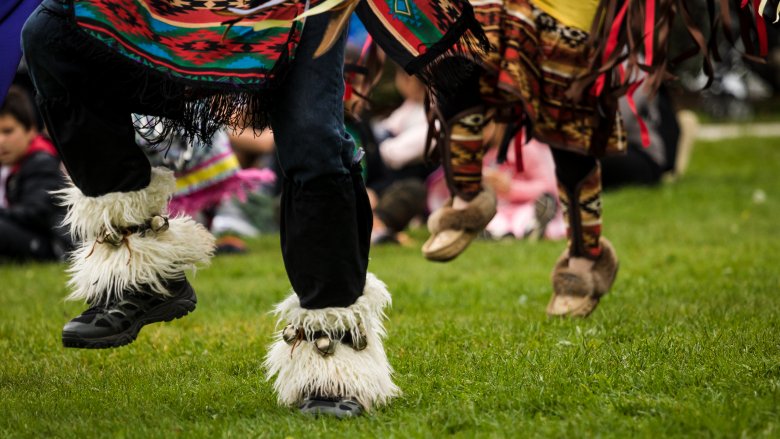12 Things You Should Never Do In Canada
Canada! The Great White North! As the United States' neighbor to the immediate north full of people who mostly speak English, Canada is frequently the first (or only) foreign country many Americans visit. If you're from the U.S. (or elsewhere) and are planning a trip to the proud and mighty land where maple syrup grows on trees, there are a handful of things you should not do while there if you want to avoid annoying, offending, or even angering a stranger. While Canada is renowned as a nation of polite people, some buttons just shouldn't be pushed.
Assuming you weren't raised in a barn and you know not to ask people if they live in an igloo or if they travel everywhere by dog sled, here are some of the things you should avoid if you want your visit to Canada to go as smoothly as a curling rock sliding into the house.
Don't swoon over the PM
It's pretty easy for foreigners, especially Americans, to look at Canada's current (as of this writing) prime minister with some envy. He's young, good-looking, charming, fashionable, relatively modern and progressive in many of his policies, and, for lack of a better word, pretty cool, which some other major Western leaders are, uh, not. Your sassy Wine Aunt probably posts googly-eyed memes of him on Facebook and calls him President Boyfriend Material or something.
But don't assume that most people inside Canada think Trudeau is as cool as outsiders do. Sure, he may seem like some kind of rock star god in comparison to other world leaders, but in his own country, the bloom was off the rose within a few years of his election. According to the Washington Post, Trudeau has garnered criticism from all sides for issues as far-ranging as being "an intellectual lightweight" to wearing an embarrassing outfit when he went to visit India. He's also had issues dealing with Quebec, indigenous affairs, and relations with China, as well as being slammed by the Guardian for what they call his disastrous climate change policy. Then there's what Time calls "one of the biggest political scandals in Canadian history."
So don't presume Canadians think he's the coolest cat around just because he no-sold Donald Trump's alpha male handshake one time.
Don't do the voice
This is one of those things that should be obvious, but apparently it needs to be said: If you go to Canada, don't make fun of the way they talk. As Reader's Digest (Canadian edition, naturally) points out, when people put on a fake Canadian accent as a joke, it's not even an accurate accent. It's some antiquated and exaggerated version of how some Canadians might have spoken 150 years ago.
Additionally, one of the most commonly heard chestnuts — thanks in part to movies like Chasing Amy — is that Canadians say "aboot" instead of "about." But if you listen to an actual Canadian talk or even just flip on an episode of Degrassi for like five minutes, you'll notice that what they say is a lot more like "aboat," and is actually — thanks to a linguistic shift called Canadian raising — much more complicated. So, seriously, lay off the "aboot" stuff. It's not a good goof, it's tired as heck, and it's not even an accurate burn! Get some new material.
And then there's "eh," eh? Some Canadians do say "eh" and some of them say it a lot — as a tag on an opinion, to show surprise, or to soften a command, among other reasons. While some Canadians might have embraced it as emblematic of their national identity, others might be embarrassed or frustrated by the stereotype. So just be chill about it, eh?
Keep your mind on the money and the money on your mind
If you ask a bunch of Canadians for advice about what to avoid doing on a visit to Canada, you'll probably hear a number of different responses having to do with money, so here are a handful of those. The most common suggestion? Under absolutely no circumstances should you make a joke about Canadian money looking like Monopoly money. It's the only joke more tired than saying "aboot," and making this joke is in fact a capital offense in Canada, a country which otherwise does not have the death penalty. (Are we joking? Better not take chances.) Additionally, don't be weird about the fact that the Queen of England is on the money. Don't ask them if they're British; maybe instead take that time to open a history book or Google the word "commonwealth." It's a whole thing.
Also don't try to pay for things in American money, and don't try to get American dollars in change for Canadian money. Outside of some border towns, most retail locations probably don't have American money. And definitely don't get mad and call American dollars "real money" if someone won't accept it.
Finally, make sure you exchange all your dollar and two-dollar coins for bills before you leave the country because most banks will not exchange coins, so something worth a dollar in Canada is only a souvenir when you get home.
Don't think of it as a liberal paradise
It might be tempting to think of Canada as some kind of progressive wonderland, thanks to its generally peace-loving attitude, its socialized medicine, its welcoming of refugees, and its overall reputation as a bunch of friendly, chill people. But to be fair, any country would look pretty chill when standing next to America, the international equivalent of a 7,000-foot-tall cowboy dual-wielding AR-15s, farting carbon, waving its ding-dong in the air, and raring to start a fight with any nation that looks at it cockeyed. But you shouldn't assume Canada is some progressive paradise that's ready to welcome you with open arms if an election doesn't go your way. As the Guardian points out, it has its share of issues, including the fact that it's the world's second-largest arms dealer to the Middle East, its Albertan oil sands have a bigger carbon footprint than the entire state of California, and its intelligence agencies are allowed to obtain information via torture. Furthermore, its much-vaunted healthcare system has had its budget slashed, and much of the economy is based on extraction of fossil fuels.
Then there are super-duper hot button issues like the poor treatment of Canada's indigenous peoples, many of whom have trouble accessing clean water, and the question of Quebec separatism and sovereignty. These are touchy topics! In short, maybe just leave politics at home unless you're talking to someone you know well or if you want to hear someone go off.
Ne présume pas de la langue
It's pretty well known that Canada has two official languages, English and French. In fact, the two languages officially have equal status within the federal government. As such, it's pretty common for foreigners to believe that every Canadian is bilingual, speaking both English and French. However, the fact is that the majority — about 60 percent — of Canadians speak English as their primary language, and many of those may not know French at all. Only about 21 percent of the Canadian population speaks French as their primary language, and most of those live in Quebec. (The other 19 or so percent is made up of various migrant languages and indigenous dialects.) So, just to be on the safe side, probably don't assume everyone outside Quebec can speak French.
That said, probably don't assume that everyone inside Quebec can speak English. Nearly 80 percent of people in Quebec speak French as their primary language and about 95 percent speak it as their first or second language, and they take it seriously. They use French in places where French people would use English loan words, such as traffic signs, and you also shouldn't assume that knowledge of Parisian French will be 100 percent compatible with Quebecois French. But if you are going to Quebec, you probably should acquaint yourself with their unique brand of swearing, and learn the power of a well-placed "tabarnak!"
They don't know your friend (probably)
Canada is a big place. Sure, on paper, you understand that. You know that it's the second-largest country by area in the world. Nevertheless, it can be easy to underestimate the sheer size of the place. It encompasses five time zones and stretches over 5,000 miles from coast to coast. To drive from Canada's most visited city, Toronto, to its second-most visited city, Vancouver, would take over 40 hours. Driving from Toronto to the next province to its west would take a full day; driving from Toronto to Montreal would take six hours. These are things that a visitor should take into account while planning an itinerary, of course, because neglecting to factor its nearly 4 million square-mile expanse into your plans could be a costly mistake. Additionally, Canada has a population of about 37 million people, which, while slightly less than the population of California and only a little more than a tenth of the population of the United States, is still nothing to sneeze at. A pretty good number of people spread out across an enormous amount of space.
All of that to say no, Canadians don't all know each other. It would be ridiculous to ask someone from Newfoundland if they know someone from Manitoba just because they're both from Canada. Sure, on paper you understand this. But it's still tempting to do it.
Shut up about Toronto
The United States' largest city, New York, enjoys a certain kind of mythologized glamor among Americans; if you can make it there, they say, you can make it anywhere. It's got some of America's best-known landmarks, many of its most famous cultural centers, and apparently some kind of magical water that, according to residents, allows the world's only good pizza and bagels to be made within its borders. Even people who have never been to New York know what it looks like because approximately 98 percent of all TV shows and movies are set there. T-shirts across the nation boldly proclaim that their wearers heart NY.
It would be a mistake, however, to assume that Canada's largest city, Toronto, enjoys the same sort of reputation. In fact, generally speaking, outside Toronto, Canadians hate Toronto. Why? All sorts of reasons, it turns out. According to Vice, Toronto has a reputation as an arrogant and selfish city, which not only looks down on the rest of the country, but which has historically been privileged by the government at the expense of less elite areas. Additionally, its cosmopolitan opinion of itself is not seen as earned, as the city suffers from crumbling infrastructure and a legacy of racist policies. So, if you're outside Toronto, probably don't talk about how cool Toronto is, and definitely don't call it the capital. (It's not. Ottawa is the capital.)
Shut up about America
On the surface, there are a number of reasons someone might associate Canada with the United States: They are strong allies, they share the world's longest undefended border, they both have fraught histories as former British colonies, they are both countries where the majority of people speak English, some of their regional accents are the same or similar, many popular American celebrities are originally from Canada, and so on.
But one of the most efficient ways of angering a Canadian is by comparing the U.S. and Canada. Don't say they're the same, don't call Canada the 51st state, don't call it America Junior, and don't call it America's Hat. Canada has striven since gaining self-governance over 150 years ago to define its own unique national identity as distinct from its southern neighbor. To ignore that is insulting, especially in light of the way that America frequently comports itself as a loud, brash contrast to Canada's quiet, polite reputation. Similarly, non-American visitors to Canada should not ask Canadians to account for America's behavior. They're a whole other country, dogg. What America does is not under their control. On the other hand, American visitors may want to think twice before asking a Canadian their opinion of the U.S., as that's a real "be careful what you wish for, you just might get it" kind of situation.
Don't trash talk Timmy's
There are certain things that become so firmly embedded into a culture that they become institutions, part of a cultural identity that will be fiercely defended from criticism from outsiders, even if insiders themselves might find fault with them. Kind of like how only you can make fun of your little brother and you'll beat up anyone else who tries it. For Canadians, a major example of such a cultural institution is Tim Hortons, a beloved and ubiquitous fast food chain famous for its coffee and doughnuts, founded by and named after hockey hall of famer Tim Horton. If you go to Canada, under no circumstances should you disparage Tim Hortons. Canadians eat more doughnuts per capita than any other country in the world. They take it seriously; do not talk trash about this cherished national icon. Sure, not every Canadian loves Timbits and a double double, but they would tell you that privately, quietly, behind closed doors. If you don't have anything nice to say about Timmy's while in Canada, it's probably best that you don't say anything at all.
There are a number of other such cultural institutions where national identity is so tied up in them that you should probably keep criticism to yourself. These include, of course, ice hockey, maple syrup, poutine, and Canadian beer. Sure, these may be stereotypically Canadian things, but sometimes stereotypes exist for a reason.
It's not all one thing
For many Americans, their ideas about Canada frequently only come from certain provinces, especially Ontario and Quebec. Ideas like the American conception of the Canadian accent, speaking French, and milk in a bag are really things from the eastern half of the country. Canada is, again, a really big place with people spread way out all over it. As a result, you shouldn't assume that the country is a monoculture where you can visit one area and assume the rest is just like it. The different regions of Canada feature a variety of cultures, cuisines, climates, and landscapes that each deserve to be explored on their own terms.
British Columbia, for example, is known for its temperate climate and outdoorsy culture that often draws comparisons to California. Alberta, meanwhile, is known for its mountain skiing and its weird cowboy stuff, like the Calgary Stampede. Saskatchewan and Manitoba are sparsely populated, largely rural, and relatively conservative areas. Ontario is where Toronto is. Niagara Falls is there. You've heard of it, probably. Quebec is the French one, with its own language and cuisine and swears. The Maritimes are replete with boats and people who like to be on boats. If you don't know Newfoundland's rather unfair reputation, well if you imagine the stereotypes about the Welsh, you'd be on the right track. But just let them live in peace.
Be cool at the border
While the U.S.-Canada border is often referred to as the longest undefended border in the world, that's really only true in the sense that it's not defended militarily. There are still civilian police and border security accounting for those coming in and out of each country. And while the relatively relaxed relationship between the two countries might lead you to believe that passage back and forth across the border will be a similarly relaxed affair, you should probably not underestimate border security. Despite Canada's reputation as a polite and apologetic culture, border security agents take their jobs seriously and are strict about visitors having the appropriate paperwork.
While it used to be true in times gone by that a driver's license was sufficient identification to cross into Canada from the U.S., that is no longer the case. Nowadays, you absolutely must have a passport or equivalent, and in some cases, you might need additional paperwork, such as a travel visa or veterinary papers if you're traveling with a pet. Furthermore, if you have a criminal record, there's a chance you might be denied entry into Canada. Just ask Chris Brown, who had to cancel legs of a tour planned in Toronto and Montreal in 2015 after being denied entry into the country for reasons of "criminal inadmissibility," due to ... well, you know what Chris Brown did.
Don't be racist
One of the most sensitive subjects among Canadians besides French-English relations is the issue of treatment, both past and present, of its indigenous peoples. Like many countries, Canada continues to grapple with how best to confront its colonial past, and this can be a touchy subject for some people, and probably best left alone unless you can deal with it sensitively and with empathy for people who continue to suffer the negative effects of colonial practices.
Similarly, don't disrespect Canada's First Nations people. One of the easiest ways to show respect is to be careful with what language you use to refer to them, but this can be tricky if you don't know what's considered appropriate. This rather thorough blog post lays out the loaded history of certain words and explains why terms like "Indian" and "Eskimo" are generally not considered appropriate in most contexts. "Native American" is, of course, the preferred term in the U.S., but doesn't fit quite as well in Canada where basically no one wants to be thought of as American. The term currently in favor is First Nations, as it recognizes their position as the original inhabitants of the land, their sovereignty as nations, and the fact that there are multiple groups with very different cultures contained under that umbrella term. The safest thing, of course, is to ask any individual member of such a community their preferred term. Be nice. Like a Canadian.
